Signs of the Times • 19 April 2018 • No. 159
Special edition
EARTH DAY – 22 April 2018
¶ Processional. “Pleni sunt caeli et terra gloria tua. Osanna, Osanna in excelsis.” (“Heaven and earth are full of thy glory. Hosanna, hosanna in the highest.”). —“The Ground,” by Ola Gjeilo, performed by the Heritage Concert Choir at Western Washington University
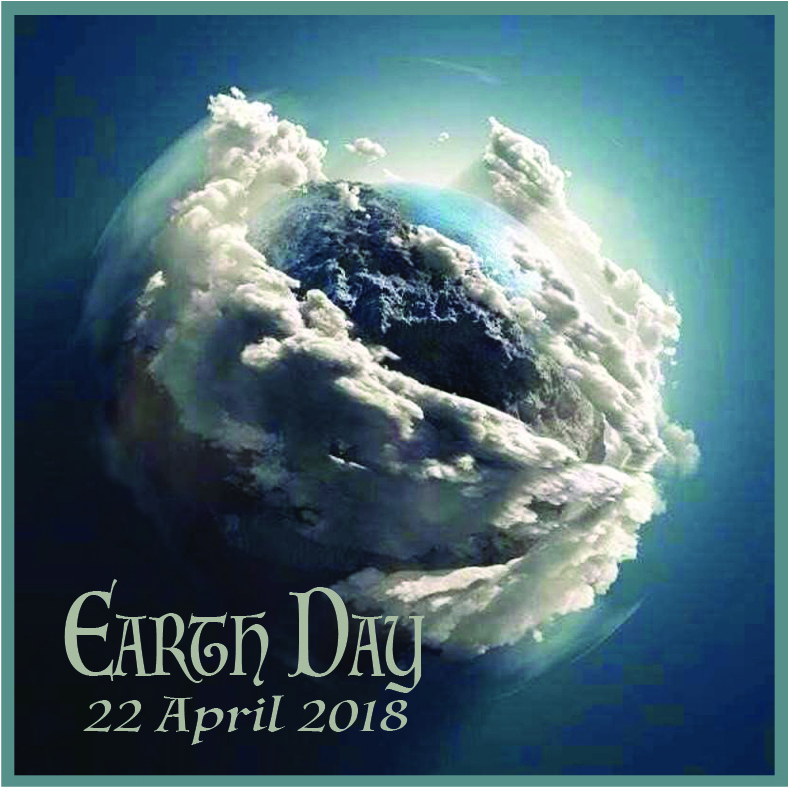
¶ Invocation. “I thank You God for most this amazing / day: for the leaping greenly spirits of trees / and a blue true dream of sky; and for everything / which is natural which is infinite which is yes.” —e.e. cummings
¶ Testify. Watch my 3-year-old grandson, J.J., recite from memory e.e. cumming’s poem.
¶ Call to worship. “Earth is so thick with divine possibility that it is a wonder we can walk anywhere without cracking our shins on altars.” —Barbara Brown Taylor
¶ Hymn of praise. “Turn down your gaze upon the earth / Where is the One who never sleeps? / We call on One who  guards you now / Your spirit safe in holy keep.” — Richard Bruxvoort Colligan, “God Is Holding Your Life” (Thanks Brian.)
guards you now / Your spirit safe in holy keep.” — Richard Bruxvoort Colligan, “God Is Holding Your Life” (Thanks Brian.)
¶ “The Earth—A Living Creature,” an amazing NASA Video. (1:28. Thanks David.)
¶ Take the quiz: “Earth Day Quiz.” —earthday.org
¶ “Humanity’s total Ecological Footprint—a measure of global demand for natural resources—remained virtually constant in 2014 compared to 2013, according to new data released by Global Footprint Network today at an event at Oxford University. In another positive sign, the global Ecological Footprint per person actually decreased by 1.1 percent in 2014 compared to 2013. Still humanity’s demand for renewable resources remains 68 percent higher than what the planet can renew.” —“Has humanity’s Ecological Footprint reached its peak?” Global Footprint Network
¶ Confession. If everyone in the world created as much trash as we do in the US, we would need at least four planets to meet our demand for natural resources and absorb our waste and pollution. —ecoclean
Earth Day resources for local congregations
§ “Realm of earth, rule of Heaven: Bodified faith and environmental activism.”
“The greatest failure in the history of Christian thought is the separation of souls from bodies, spirit from soil, the wrenching of hearts from habitation—all representing the abdication of the realm of earth from the rule of Heaven.”
§ "Earth Day: The link between Easter and Pentecost," a meditation.
“Easter’s focus is always sharper when allied with Earth Day. We sing, properly, of being wayfaring strangers. “A  wandering Aramean was my ancestor” (Deuteronomy 26:5) is among the oldest testimonies of fate and faith. We are indeed strangers; but not foreigners. In common usage these two words seem similar. Biblically speaking, though, the theological difference could not be greater.”
wandering Aramean was my ancestor” (Deuteronomy 26:5) is among the oldest testimonies of fate and faith. We are indeed strangers; but not foreigners. In common usage these two words seem similar. Biblically speaking, though, the theological difference could not be greater.”
§ “All People That On Earth Do Dwell,” old hymn, new lyrics.
"Though darkness threaten Love’s consent, Though feet, confounded, lose their way / Yet doth my heart rest, confident, Of Incarnation’s full display."
§ “Earth’s habitus: A meditation on creation,” a poem.
“Creation is not simply the props and drops, / the costumes and orchestra, / the catwalks and footlights / on the stage of salvation’s drama. / Rather, creation is an active part / in history’s narration. / Without the cosmos, / Salvation’s story / cannot be comprehended.”
§ “Heaven’s Delight and Earth’s Repose,” a litany for worship inspired by Psalm 145
“Worthy, worthy the One who conceived the earth and gave birth to bears and basil and beatitudes alike. / We extol you, Heaven’s Delight and Earth’s Repose! / So now, every hill and habitation, every honey bee and human heart, rejoice and give thanks.”
§ “Satisfy the earth,” a litany for worship on Earth Day
“In the beginning the Verdant One saw everything that was made, and behold, it was lavish and delightful. (Genesis 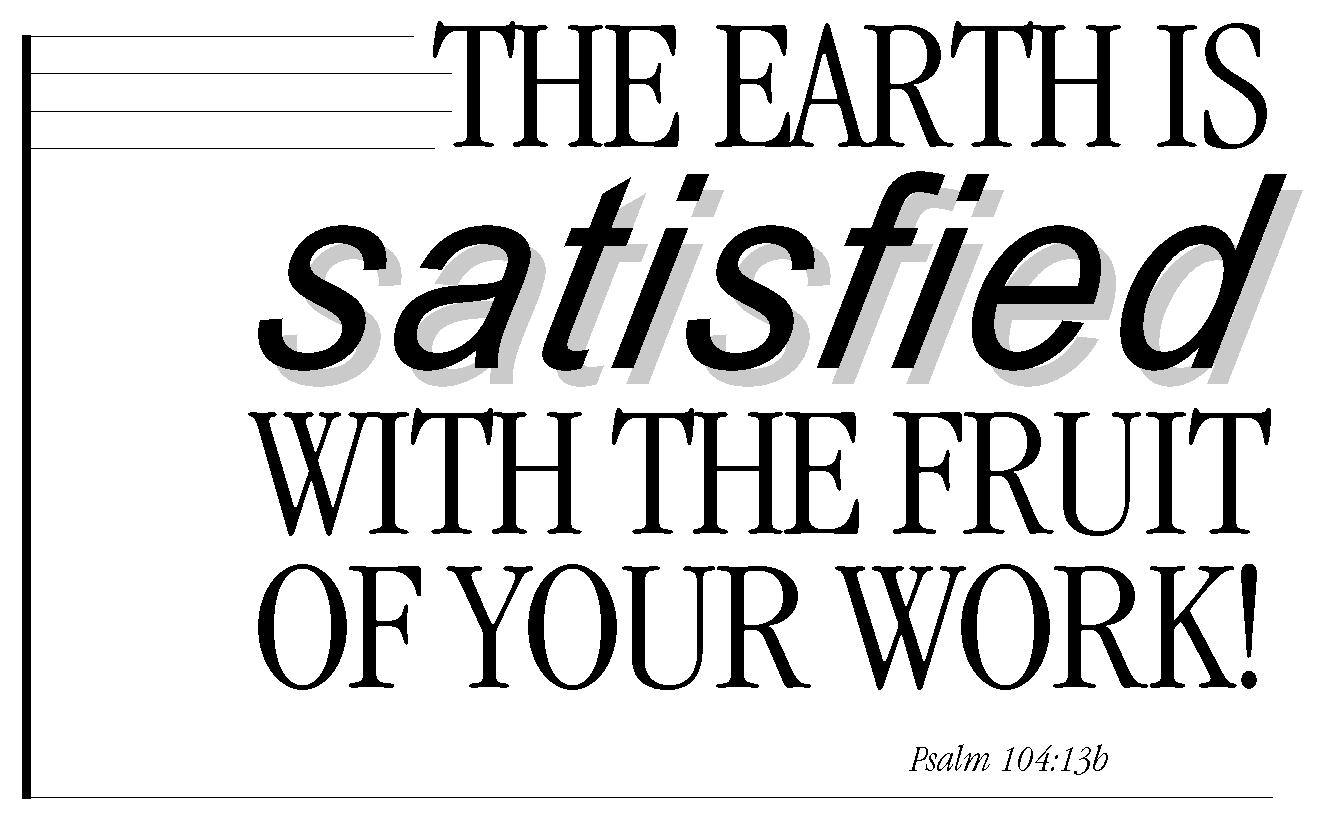 1:31) / The earth is satisfied with the fruit of God’s greening hand. (Psalm 104:13) / Let the heavens be glad and the earth applaud. Let the sea roar, and the field exult, and all trees of the forest rejoice. (Psalm 96:11-12)”
1:31) / The earth is satisfied with the fruit of God’s greening hand. (Psalm 104:13) / Let the heavens be glad and the earth applaud. Let the sea roar, and the field exult, and all trees of the forest rejoice. (Psalm 96:11-12)”
§ “The earth is satisfied,” a litany for worship on Earth Day.
“From the earth’s rich soil our souls emerge. With creation’s Breath our lungs are filled. / Even as the envoys of peace weep, when the rocks tremble and the ground itself mourns, say aloud: God is worth the trouble! / The earth is satisfied with the fruit of your work!”
§ "Go out in joy," a litany for worship adapted from St. Francis' "Canticle of the Sun" and related Scripture texts.
“What is it you wish to know, oh mortal one? / Do you think you must ascend to the highest heaven or descend to the deepest pit? / Do you not know that Wisdom has pitched a tent in your midst? / Ask the four-legged, and they will mentor you, or the winged-of-air, and they will school you.”
§ “Covenant-making on Earth Day,” a sample pledge statement to encourage concrete practices to sustain the earth.
§ “The earth is the Lord’s," a collection of biblical texts which reveal the non-human parts of creation responding to God’s presence, promise and purpose.
§ “The earth is the Lord’s,” a litany for use in worship on Earth Day.
“Let the heavens be glad, and let the earth rejoice; let the sea roar, and all that fills it; let the fields exult and all  the trees sing for joy. / The mountains beheld the Beloved, and writhed; the deep bellowed and pummeled the air with its waves.”
the trees sing for joy. / The mountains beheld the Beloved, and writhed; the deep bellowed and pummeled the air with its waves.”
§ “Pacem in terris,” a poem.
“We seek no flight to another terrain / for it is this very domain— / every meadow’s shadow, every peak’s brow, / every river’s careen, every furrow’s plough— / which asserts heaven’s riposte to hades’ advance. / ‘Thy will . . . on earth.’”
§ “Set our hearts on fire,” a litany for worship inspired by Psalm 65.
“Oh, visit the earth, ask her to join the dance! Coax rain from the sky. Drench thirsty fields awaiting your touch, ready the land for blossom and fruit. Burden every stalk with grain sufficient to satisfy the hunger of all.”
§ “Life began in a garden,” a collection of quotes on gardents.
“For the Lord will comfort Zion; God will comfort all her waste places, and will make her wilderness like Eden, her desert like the garden of the Lord; joy and gladness will be found in her, thanksgiving and the voice of song." —Isaiah 51:3
§ “Holy Great Smokies,” a call to worship recalling the mountain sites of covenant and confrontation in Scripture.
“Great are you, O God, and greatly to be praised. Your holy Great Smokies are the joy of all the earth. Break forth  in singing, you Sierra Madres, you forests and every wild flower. . . . / Come, let us go up to Grandfather Mountain. There the Beloved will teach us the ways of righteousness that we may walk on the path of mercy.”
in singing, you Sierra Madres, you forests and every wild flower. . . . / Come, let us go up to Grandfather Mountain. There the Beloved will teach us the ways of righteousness that we may walk on the path of mercy.”
Right: Art by Meinrad Craighead.
¶ Hymn of supplication. “I see the bad moon a-rising / I see trouble on the way / I see earthquakes and lightning / I see bad times today / I hear hurricanes a-blowing / I know the end is coming soon / I fear rivers overflowing / I hear the voice of rage and ruin.” —Credence Clearwater Revival, “Bad Moon Rising”
¶ Words of assurance. “This fruit does make my soul to thrive / It keeps my dying faith alive / This fruit does make my soul to thrive / It keeps my dying faith alive / Which makes my soul in haste to be / With Jesus Christ the apple tree.” —“Jesus Christ the Apple Tree,” sung by the Choir of King's College, Cambridge (Thanks Mike.)
¶ Earth overshoot day. In 2017, the combination of consumption and waste production “overshot” Earth’s capacity in early August. In other words, we spent the Earth’s annual sustainable “budget” in less than two-thirds of the year. Learn more from this video (3:35) from Sustainability Illustrated.

¶ Professing our faith. "The resurrection places Jesus on this side of the grave, here and now, in the midst of this life. The Good News of the resurrection is not that we shall die and go home with him but that he is risen and comes home with us, bringing all his hungry, naked, thirsty, sick, prisoner brothers with him." —Clarence Jordan
¶ Short story. "What a sight to see! Grandma coming home from church in her Sunday best, stepping out of her car carrying a large green trash bag, bulging with empty beer cans, bottles and sandwich wrappers. 'What in the world are you doing?' I gulped. 'Cleaning up the lane,' Grandma said matter-of-factly: 'To me the world is God's cathedral, darling. I'm just tidying my pew.'" —from Guideposts magazine
¶ Hymn of intercession. “This world is so profane, / I can hear the earth screaming, / screaming in pain. / Everywhere; / There is not compassion left in us. / Why is it that so much pain is caused? / and so much injustice is done in the name of God? / Why have children stopped dreaming? / and why is it that mothers won't stop crying; / I just ask myself how can God look at us.” —English translation of lyrics in “¿Porque?” (“Why?”), Yasmin Levy
¶ A more accurate way of reading 2 Corinthians 5:17—“When a man is in Christ, he is a new creature. . .”—is this:  “When anyone is in Christ, there is a new creation.”
“When anyone is in Christ, there is a new creation.”
¶ By the numbers. “Americans throw away enough garbage every day to fill 63,000 garbage trucks. That's enough garbage in a year, that if we lined the garbage trucks end to end they would reach half way to the moon. That averages to about 7 pounds per person each day.” —“Garbage: Facts,” Idaho Public Television
¶ Short take. “While waiting to get my prescription filled, another woman at the counter asks about getting her credit card back from the clerk, but then realizes she already had. ‘I’m just back from a spiritual retreat—I’m not quite down to earth yet.’” —Ken Sehested
¶ Preach it. In his sermon, ‘The Cedar has fallen: the Prophetic Word versus Imperial Clear-Cutting,’ Ched Myers “traces the ecological disaster of the clear cutting of Lebanon’s cedars with a moving litany from the Bible itself, with the political implications (‘there was blood on the cedars that figured so prominently in Solomon’s temple and his own royal house’ (p 217), the cedars a metaphor for empire itself. ‘The bible takes sides on behalf of the trees’” (p 222). —Vern Ratzlaff’s review of David Rhoads’ book, Earth and Word: Classic Sermons on Saving the Planet
¶ Some short quotes on the earthiness of spirituality.
§ “Holy persons draw to themselves all that is earthly.” —Hildegard of Bingen
§ “Everybody wants to save the earth; nobody wants to help Mom with the dishes.” —P.J. O'Rourke
§ “Rabbi Yochanan said: The Holy One, blessed-be-He, declared: 'I will not enter the heavenly Jerusalem until I enter the earthly Jerusalem.’” —Talmud, Taanit 5a
§ “Those who believe and humble themselves before their Lord, they will be companions of the garden.” —Qur’an,  Sutra 11:23
Sutra 11:23
§ "Heaven and earth are threads of one loom." —anonymous Shaker quoted in By Shaker Hands by June Sprigg
§ “But, if by some miracle and all our struggle, the earth is spared, only justice to every living thing will save humankind.” —Alice Walker
§ “Heaven is not some alternative to earth, allowing us to sit lightly to earth's fate. Heaven, eternal life, is a way of speaking about the quality of life that God intends for the earth. —Douglas John Hall
§ “This we know. The earth does not belong to people. People belong to the earth. This we know. All things are connected. Whatever befalls the earth, befalls the people of the earth. We did not weave the web of life. We are but a mere strand in it. Whatever we do to the web, we do to ourselves.” —Chief Seattle
§ “Even after all this time the sun never says to the earth, ‘You owe Me.’ Look what happens with a love like that. It lights up the whole sky.” —Hafiz, 14th century Persian poet
§ “Earth's crammed with heaven, / And every common bush afire with God; / But only he who sees, / takes off his shoes.” —Elizabeth Barrett Browning
¶ Can’t makes this sh*t up. “Trump Names BP Oil Spill Lawyer, Climate Policy Foe as Top DOJ Environment Attorney.” —Marianne Lavelle & John H. Cushman Jr., Inside Climate News (Thanks Betsy.)
¶ Call to the table. “The earth is, in fact, in the heavens.” —Carl Sagan
¶ The state of our disunion. “The meek shall inherit the earth, but that does not say anything about mineral rights  under the earth.” — American industrialist J. Paul Getty
under the earth.” — American industrialist J. Paul Getty
¶ Best one-liner. “A theology that is not earthed in an experience of faith tends toward a bland form of religious metaphysics.” —David Crutchley
¶ For the beauty of the earth. The 100 greatest owl pictures. —brightside.Me
¶ Altar call. “God is not in his heaven and all's well on the earth. He is on this earth and all hell's broke loose!” —Clarence Jordan
¶ Benediction. “Deep peace of the running wave to you, / Deep peace of the flowing air to you, / Deep peace of the quiet earth to you, / Deep peace of the shining stars to you, / Deep peace of the gentle night to you, / Moon and stars pour their healing light on you, / Deep peace of Christ, of Christ, / Of Christ the light of the world to you, / Deep peace of Christ to you.” —Gaelic blessing
¶ Recessional. “A Gaelic Blessing,” John Rutter, performed by The Cambridge Singers.
¶ Just for fun. “World’s Worst Sheepdog” (0:38 video. Thanks David.)
# # #
©Ken Sehested @ prayerandpolitiks.org. Language not otherwise indicated above is that of the editor, as are those portions cited as “kls.” Don’t let the “copyright” notice keep you from circulating material you find here (and elsewhere in this site). Reprint permission is hereby granted in advance for noncommercial purposes.
Feel free to copy and post any original art on this site. (The ones with “prayer&politiks.org” at the bottom.) As well as other information you find helpful.
Your comments are always welcomed. If you have news, views, notes or quotes to add to the list above, please do. If you like what you read, pass this along to your friends. You can reach me directly at kensehested@prayerandpolitiks.org.



 guards you now / Your spirit safe in holy keep.” — Richard Bruxvoort Colligan, “
guards you now / Your spirit safe in holy keep.” — Richard Bruxvoort Colligan, “ wandering Aramean was my ancestor” (Deuteronomy 26:5) is among the oldest testimonies of fate and faith. We are indeed strangers; but not foreigners. In common usage these two words seem similar. Biblically speaking, though, the theological difference could not be greater.”
wandering Aramean was my ancestor” (Deuteronomy 26:5) is among the oldest testimonies of fate and faith. We are indeed strangers; but not foreigners. In common usage these two words seem similar. Biblically speaking, though, the theological difference could not be greater.” 1:31) / The earth is satisfied with the fruit of God’s greening hand. (Psalm 104:13) / Let the heavens be glad and the earth applaud. Let the sea roar, and the field exult, and all trees of the forest rejoice. (Psalm 96:11-12)”
1:31) / The earth is satisfied with the fruit of God’s greening hand. (Psalm 104:13) / Let the heavens be glad and the earth applaud. Let the sea roar, and the field exult, and all trees of the forest rejoice. (Psalm 96:11-12)” the trees sing for joy. / The mountains beheld the Beloved, and writhed; the deep bellowed and pummeled the air with its waves.”
the trees sing for joy. / The mountains beheld the Beloved, and writhed; the deep bellowed and pummeled the air with its waves.” in singing, you Sierra Madres, you forests and every wild flower. . . . / Come, let us go up to Grandfather Mountain. There the Beloved will teach us the ways of righteousness that we may walk on the path of mercy.”
in singing, you Sierra Madres, you forests and every wild flower. . . . / Come, let us go up to Grandfather Mountain. There the Beloved will teach us the ways of righteousness that we may walk on the path of mercy.”
 “When anyone is in Christ, there is a new creation.”
“When anyone is in Christ, there is a new creation.” Sutra 11:23
Sutra 11:23 under the earth.” — American industrialist J. Paul Getty
under the earth.” — American industrialist J. Paul Getty
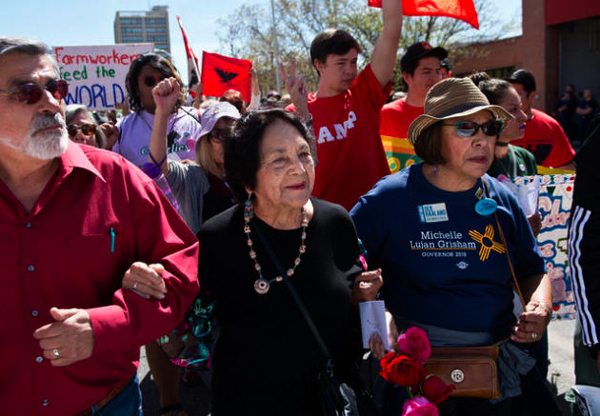 Delano grape strike in 1965 in California and was the lead negotiator in the workers’ contract that was created after the strike. She is the one who began using the Spanish phrase Sí, se puede (“yes it can be done”) in union rallies and marches, which became the motto of the UFW.
Delano grape strike in 1965 in California and was the lead negotiator in the workers’ contract that was created after the strike. She is the one who began using the Spanish phrase Sí, se puede (“yes it can be done”) in union rallies and marches, which became the motto of the UFW. War II were a sacrifice to God.
War II were a sacrifice to God. National Opera and four Welsh choirs
National Opera and four Welsh choirs  the protesting states have seen reductions of 6% or more from their peak. . . .”
the protesting states have seen reductions of 6% or more from their peak. . . .” decades, teachers are contributing more and more toward health care and retirement costs as their pay falls further behind. Teacher pay (accounting for inflation) actually fell by $30 per week from 1996 to 2015, while pay for other college graduates increased by $124.” —
decades, teachers are contributing more and more toward health care and retirement costs as their pay falls further behind. Teacher pay (accounting for inflation) actually fell by $30 per week from 1996 to 2015, while pay for other college graduates increased by $124.” —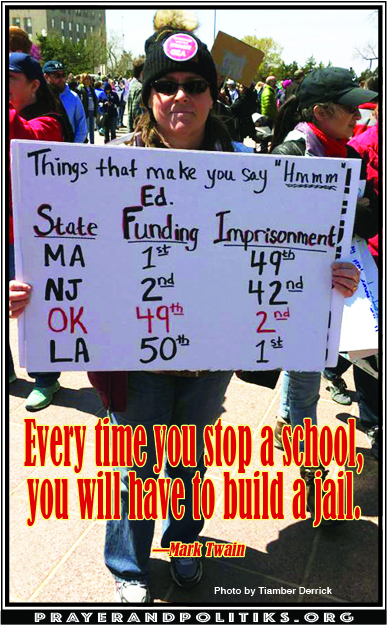 teacher pay is 1.6% below their average earnings in 1999 and 5% lower than their 2009 pay, adjusted for inflation, according to the Department of Education.” —
teacher pay is 1.6% below their average earnings in 1999 and 5% lower than their 2009 pay, adjusted for inflation, according to the Department of Education.” —
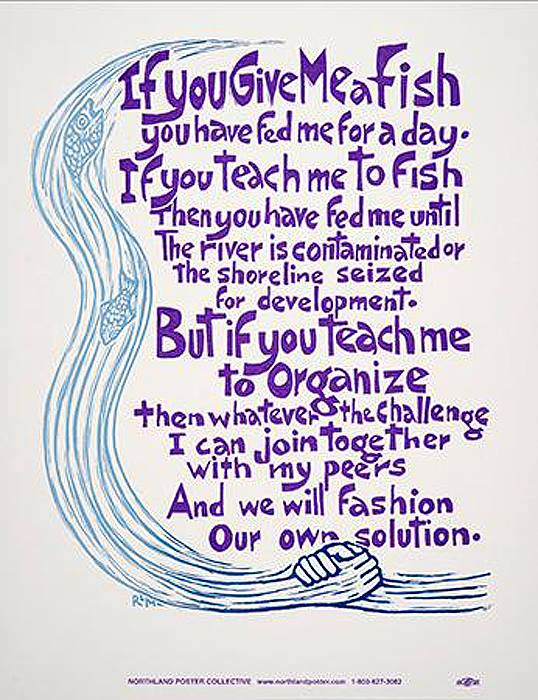 ¶ Benediction. “
¶ Benediction. “ ©Ken Sehested @ prayerandpolitiks.org. Language not otherwise indicated above is that of the editor, as are those portions cited as “kls.” Don’t let the “copyright” notice keep you from circulating material you find here (and elsewhere in this site). Reprint permission is hereby granted in advance for noncommercial purposes.
©Ken Sehested @ prayerandpolitiks.org. Language not otherwise indicated above is that of the editor, as are those portions cited as “kls.” Don’t let the “copyright” notice keep you from circulating material you find here (and elsewhere in this site). Reprint permission is hereby granted in advance for noncommercial purposes. (Che) Guevara, and Camilo Cienfuegos—welcomed Fidel to Havana one week later, where the charismatic leader formally declared victory before a massive crowd of supporters convinced that a new day had dawned on the economically and educationally deprived nation.
(Che) Guevara, and Camilo Cienfuegos—welcomed Fidel to Havana one week later, where the charismatic leader formally declared victory before a massive crowd of supporters convinced that a new day had dawned on the economically and educationally deprived nation. of these have been openly supportive of the “revolutionary project.” Others have been either privately or publicly critical of the “excesses” of the Revolution. Most have verbalized both satisfaction and criticism, a not uncommon assessment of the state of their country. Their current unease has to do with uncertainty over the political future of Cuba, and specifically over the identity of Raul’s successor.
of these have been openly supportive of the “revolutionary project.” Others have been either privately or publicly critical of the “excesses” of the Revolution. Most have verbalized both satisfaction and criticism, a not uncommon assessment of the state of their country. Their current unease has to do with uncertainty over the political future of Cuba, and specifically over the identity of Raul’s successor. recalled, and Trump ordered the expulsion of most of the Cuban diplomatic corps in Washington. Yet Trump chose not to break off diplomatic relations outright, an omission that did not go down well with wealthy Cuban American supporters, especially in south Florida, who accused him of failing to fulfill a more dramatic course of action promised them during the 2016 election campaign.
recalled, and Trump ordered the expulsion of most of the Cuban diplomatic corps in Washington. Yet Trump chose not to break off diplomatic relations outright, an omission that did not go down well with wealthy Cuban American supporters, especially in south Florida, who accused him of failing to fulfill a more dramatic course of action promised them during the 2016 election campaign. Cuba. We’ll lobby our government to restore the U.S. embassy in Havana to a full complement of consular officers so that Cubans wishing to travel to the U.S. will have at least an even chance of doing so. We’ll continue to demand that the Trump administration allow the Cuban embassy on 16th Street in Washington to be fully staffed in order to provide the full range of services that countries with normal diplomatic relations are supposed to provide to citizens of both countries.
Cuba. We’ll lobby our government to restore the U.S. embassy in Havana to a full complement of consular officers so that Cubans wishing to travel to the U.S. will have at least an even chance of doing so. We’ll continue to demand that the Trump administration allow the Cuban embassy on 16th Street in Washington to be fully staffed in order to provide the full range of services that countries with normal diplomatic relations are supposed to provide to citizens of both countries. enforced by a long succession of presidential executive orders – was 96-4. President Bill Clinton signed Helms-Burton, which now can be brought down only by congressional action and the signature of another U.S. president. This is a tall order, to be sure, especially in the Trump era, fraught as it is with foreign policy crises spanning the globe.
enforced by a long succession of presidential executive orders – was 96-4. President Bill Clinton signed Helms-Burton, which now can be brought down only by congressional action and the signature of another U.S. president. This is a tall order, to be sure, especially in the Trump era, fraught as it is with foreign policy crises spanning the globe.
 Another clear example of the same economic incentive for restored trade is Louisiana. Now that the shipping industry in and around New Orleans is flourishing following years of slow recovery from Hurricane Katrina’s devastation, ships moving goods from the Crescent City to Havana would amount to a boon to Louisiana’s economy, as well as that of several Midwestern states that ship corn, wheat and other agricultural produce down the Mississippi to the Port of New Orleans. Governors of both parties from these states long have pressured Washington to restore relations, knowing that trade with Cuba would provide relief to their beleaguered farm industries.
Another clear example of the same economic incentive for restored trade is Louisiana. Now that the shipping industry in and around New Orleans is flourishing following years of slow recovery from Hurricane Katrina’s devastation, ships moving goods from the Crescent City to Havana would amount to a boon to Louisiana’s economy, as well as that of several Midwestern states that ship corn, wheat and other agricultural produce down the Mississippi to the Port of New Orleans. Governors of both parties from these states long have pressured Washington to restore relations, knowing that trade with Cuba would provide relief to their beleaguered farm industries. provincial and national legislatures will be chosen. The National Assembly will then chose a new president to succeed Raúl Castro, who retires on 19 April.
provincial and national legislatures will be chosen. The National Assembly will then chose a new president to succeed Raúl Castro, who retires on 19 April. presidential elections, average turnout over the last 50 years is less than 55%. In mid-term elections that number goes down to 34.4. In most major cities, fewer than 15% of eligible voters participate. —for more see Drew DeSilver, “US trails most developed countries in voter turnout,”
presidential elections, average turnout over the last 50 years is less than 55%. In mid-term elections that number goes down to 34.4. In most major cities, fewer than 15% of eligible voters participate. —for more see Drew DeSilver, “US trails most developed countries in voter turnout,” 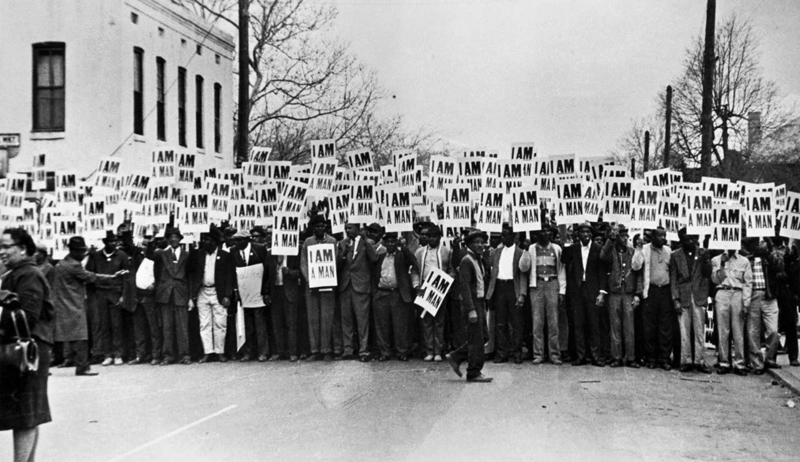 Above: Memphis, Tennessee sanitation workers on strike, 1968.
Above: Memphis, Tennessee sanitation workers on strike, 1968.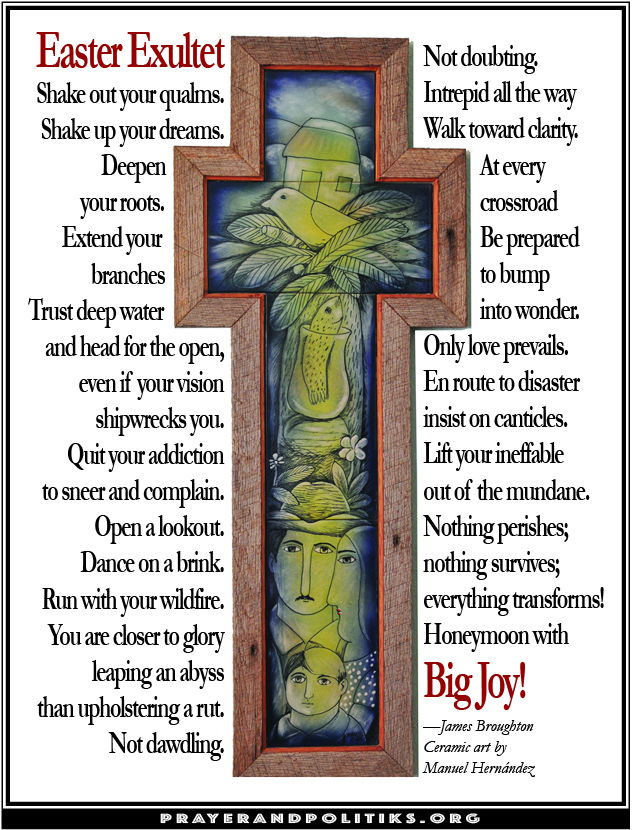
 of every national newspaper.” —11-year-old
of every national newspaper.” —11-year-old  through downtown for what Starkville Mayor Lynn Spruill called “the biggest parade we’ve ever had in Starkville, absolute biggest.” City permit for the march was originally denied by the town’s aldermen but later reversed. March organizer Bailey McDaniel, along with her partner, Emily Turner (see photo at left), “I’m thankful for Starkville Police, they were amazing,” McDaniel said. “We took a huge group photo after. Chief (Frank Nichols) was on our side.” —
through downtown for what Starkville Mayor Lynn Spruill called “the biggest parade we’ve ever had in Starkville, absolute biggest.” City permit for the march was originally denied by the town’s aldermen but later reversed. March organizer Bailey McDaniel, along with her partner, Emily Turner (see photo at left), “I’m thankful for Starkville Police, they were amazing,” McDaniel said. “We took a huge group photo after. Chief (Frank Nichols) was on our side.” — thy pity without end? / O make me thine forever; / and should I fainting be, / Lord, let me never, never / outlive my love for thee.” —Darrell Adams, in a gorgeous rendition of “
thy pity without end? / O make me thine forever; / and should I fainting be, / Lord, let me never, never / outlive my love for thee.” —Darrell Adams, in a gorgeous rendition of “ disasters) recently issued a new “strategic plan” for the coming four years, failed to mention climate change, global warming, sea-level rises, extreme weather, or any other terminology associated with scientific predictions of rising temperatures and their effects. —see
disasters) recently issued a new “strategic plan” for the coming four years, failed to mention climate change, global warming, sea-level rises, extreme weather, or any other terminology associated with scientific predictions of rising temperatures and their effects. —see 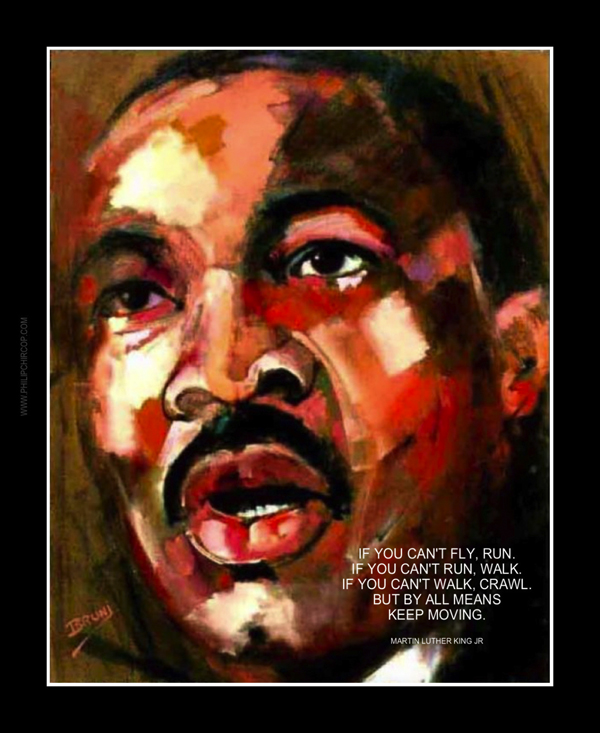 April 1968, the night before his assassination.
April 1968, the night before his assassination. loot the treasury of fear.” —continue reading “
loot the treasury of fear.” —continue reading “ Above: Sculpted relief by Margaret Beaudette of Mary Magdalene proclaiming "The First Easter Homily"
Above: Sculpted relief by Margaret Beaudette of Mary Magdalene proclaiming "The First Easter Homily"